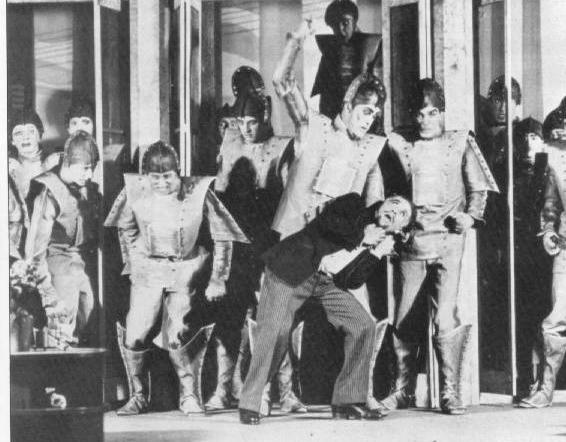|
Postapocalyptic
Apocalyptic and post-apocalyptic fiction are genres of speculative fiction in which the Earth's (or another planet's) civilization is collapsing or has collapsed. The apocalypse event may be climatic, such as runaway climate change; astronomical, an impact event; destructive, nuclear holocaust or resource depletion; medical, a pandemic, whether natural or human-caused; end time, such as the Last Judgment, Second Coming or Ragnarök; or any other scenario in which the outcome is apocalyptic, such as a zombie apocalypse, AI takeover, technological singularity, dysgenics or alien invasion. The story may involve attempts to prevent an apocalypse event, deal with the impact and consequences of the event itself, or it may be post-apocalyptic, set after the event. The time may be directly after the catastrophe, focusing on the psychology of survivors, the way to keep the human race alive and together as one, or considerably later, often including that the existence of pre-catastrop ... [...More Info...] [...Related Items...] OR: [Wikipedia] [Google] [Baidu] |
Dysgenics
Dysgenics refers to any decrease in the prevalence of traits deemed to be either socially desirable or generally adaptive to their environment due to selective pressure disfavouring their reproduction. In 1915 the term was used by David Starr Jordan to describe the supposed deleterious effects of modern warfare on group-level genetic fitness because of its tendency to kill physically healthy men while preserving the disabled at home. Similar concerns had been raised by early eugenicists and social Darwinists during the 19th century, and continued to play a role in scientific and public policy debates throughout the 20th century. More recent concerns about supposed dysgenic effects in human populations were advanced by the controversial psychologist and self-described " scientific racist" Richard Lynn, notably in his 1996 book '' Dysgenics: Genetic Deterioration in Modern Populations'', which argued that changes in selection pressures and decreased infant mortality since the I ... [...More Info...] [...Related Items...] OR: [Wikipedia] [Google] [Baidu] |
Ecological Collapse
An ecosystem, short for ecological systems theory, system, is defined as a collection of interacting Organism, organisms within a biophysical environment. Ecosystems are never static, and are continually subject to both stabilizing and destabilizing processes. Stabilizing processes allow ecosystems to adequately respond to destabilizing changes, or perturbations, in ecological conditions, or to recover from degradation induced by them: yet, if destabilizing processes become strong enough or fast enough to cross a critical threshold within that ecosystem, often described as an ecological 'tipping point', then an ecosystem collapse (sometimes also termed ecological collapse) occurs. Ecosystem collapse does not mean total disappearance of life from the area, but it does result in the loss of the original ecosystem's defining characteristics, typically including the ecosystem services it may have provided. Collapse of an ecosystem is effectively irreversible more often than not, and ... [...More Info...] [...Related Items...] OR: [Wikipedia] [Google] [Baidu] |
Cybernetic Revolt
An AI takeover is an imagined scenario in which artificial intelligence (AI) emerges as the dominant form of intelligence on Earth and computer programs or robots effectively take control of the planet away from the human species, which relies on human intelligence. Possible scenarios include replacement of the entire human workforce due to automation, takeover by an artificial superintelligence (ASI), and the notion of a robot uprising. Stories of AI takeovers have been popular throughout science fiction, but recent advancements have made the threat more real. Some public figures such as Stephen Hawking have advocated research into precautionary measures to ensure future superintelligent machines remain under human control. Types Automation of the economy The traditional consensus among economists has been that technological progress does not cause long-term unemployment. However, recent innovation in the fields of robotics and artificial intelligence has raised worrie ... [...More Info...] [...Related Items...] OR: [Wikipedia] [Google] [Baidu] |
Great Tribulation
In Christian eschatology, the Great Tribulation () is a period mentioned by Jesus in the Olivet Discourse as a sign that would occur in the time of the end. At , "the Great Tribulation" () is used to indicate the period spoken of by Jesus. uses ''tribulation'' (θλίβω) in a context denoting afflictions of those hard-pressed by siege and the calamities of war. Etymology The term "Great Tribulation" occurs four times in the New Testament: , , , and . Some take the words of Jesus in Matthew 24:21 to be describing a period of intense persecution and tribulation at the end of the age, prior to Jesus's return. Views Christians disagree over whether the Tribulation will be a relatively short period of great hardship before the end of the world and Second Coming of Christ (a school of thought sometimes called "Futurism"); or has already occurred, having happened in AD 70 when Roman legions laid siege to Jerusalem and destroyed its temple (sometimes called Preterism); or began ... [...More Info...] [...Related Items...] OR: [Wikipedia] [Google] [Baidu] |
Rapture
The Rapture is an Christian eschatology, eschatological position held by some Christians, particularly those of American evangelicalism, consisting of an end-time event when all dead Christian believers will be resurrected and, joined with Christians who are still alive, together will rise "in the clouds, to meet the Lord in the air." This view of eschatology is typically part of dispensational premillennialism, a form of Futurism (Christianity), futurism that considers various prophecies in the Bible as remaining unfulfilled and occurring in the future. The idea of a rapture as it is defined in dispensational premillennialism is not found in historic Christianity and is a relatively recent doctrine originating from the 1830s. The term is used frequently among fundamentalist theologians in the United States. The origin of the term extends from the First Epistle to the Thessalonians in the Bible, which uses the Greek word (), meaning "to snatch away" or "to seize". Differing ... [...More Info...] [...Related Items...] OR: [Wikipedia] [Google] [Baidu] |
Imagination 195403
Imagination is the production of sensations, feelings and thoughts informing oneself. These experiences can be re-creations of past experiences, such as vivid memories with imagined changes, or completely invented and possibly fantastic scenes. Imagination helps apply knowledge to solve problems and is fundamental to integrating experience and the learning process. Imagination is the process of developing theories and ideas based on the functioning of the mind through a creative division. Drawing from actual perceptions, imagination employs intricate conditional processes that engage both semantic and episodic memory to generate new or refined ideas. This part of the mind helps develop better and easier ways to accomplish tasks, whether old or new. A way to train imagination is by listening to and practicing storytelling (narrative), wherein imagination is expressed through stories and writings such as fairy tales, fantasies, and science fiction. When children develop their i ... [...More Info...] [...Related Items...] OR: [Wikipedia] [Google] [Baidu] |
Nuclear Weapon
A nuclear weapon is an explosive device that derives its destructive force from nuclear reactions, either fission (fission or atomic bomb) or a combination of fission and fusion reactions (thermonuclear weapon), producing a nuclear explosion. Both bomb types release large quantities of energy from relatively small amounts of matter. Nuclear bombs have had yields between 10 tons (the W54) and 50 megatons for the Tsar Bomba (see TNT equivalent). Yields in the low kilotons can devastate cities. A thermonuclear weapon weighing as little as can release energy equal to more than 1.2 megatons of TNT (5.0 PJ). Apart from the blast, effects of nuclear weapons include firestorms, extreme heat and ionizing radiation, radioactive nuclear fallout, an electromagnetic pulse, and a radar blackout. The first nuclear weapons were developed by the Allied Manhattan Project during World War II. Their production continues to require a large scientific and industrial complex, pr ... [...More Info...] [...Related Items...] OR: [Wikipedia] [Google] [Baidu] |
World War II
World War II or the Second World War (1 September 1939 – 2 September 1945) was a World war, global conflict between two coalitions: the Allies of World War II, Allies and the Axis powers. World War II by country, Nearly all of the world's countries participated, with many nations mobilising all resources in pursuit of total war. Tanks in World War II, Tanks and Air warfare of World War II, aircraft played major roles, enabling the strategic bombing of cities and delivery of the Atomic bombings of Hiroshima and Nagasaki, first and only nuclear weapons ever used in war. World War II is the List of wars by death toll, deadliest conflict in history, causing World War II casualties, the death of 70 to 85 million people, more than half of whom were civilians. Millions died in genocides, including the Holocaust, and by massacres, starvation, and disease. After the Allied victory, Allied-occupied Germany, Germany, Allied-occupied Austria, Austria, Occupation of Japan, Japan, a ... [...More Info...] [...Related Items...] OR: [Wikipedia] [Google] [Baidu] |
The Last Man (Mary Shelley Novel)
''The Last Man'' is an apocalyptic, dystopian science fiction novel by Mary Shelley, first published in 1826. The narrative concerns Europe in the late 21st century, ravaged by the rise of a bubonic plague pandemic that rapidly sweeps across the entire globe, ultimately resulting in the near-extinction of humanity. It also includes discussion of the British state as a republic, for which Shelley sat in meetings of the House of Commons to gain insight to the governmental system of the Romantic era. The novel includes many fictive allusions to her husband Percy Bysshe Shelley, who drowned in a shipwreck four years before the book's publication, as well as their close friend Lord Byron, who had died two years previously. ''The Last Man'' is one of the first pieces of dystopian fiction published. It was critically savaged and remained largely obscure at the time of its publication. It was not until the 1960s that the novel resurfaced for the public. Characters Lionel Verney: The ... [...More Info...] [...Related Items...] OR: [Wikipedia] [Google] [Baidu] |
Mary Shelley
Mary Wollstonecraft Shelley ( , ; ; 30 August 1797 – 1 February 1851) was an English novelist who wrote the Gothic novel ''Frankenstein, Frankenstein; or, The Modern Prometheus'' (1818), which is considered an History of science fiction#Shelley and Europe in the early 19th century, early example of science fiction. She also edited and promoted the works of her husband, the Romantic poet and philosopher Percy Bysshe Shelley. Her father was the political philosopher William Godwin and her mother was the philosopher and women's rights advocate Mary Wollstonecraft. Mary's mother died 11 days after giving birth to her. She was raised by her father, who provided her with a rich informal education, encouraging her to adhere to his own anarchist political theories. When she was four, her father married a neighbour, Mary Jane Clairmont, with whom Mary had a troubled relationship. In 1814, Mary began a romance with one of her father's political followers, Percy Bysshe Shelley, who ... [...More Info...] [...Related Items...] OR: [Wikipedia] [Google] [Baidu] |
Epic Of Gilgamesh
The ''Epic of Gilgamesh'' () is an epic poetry, epic from ancient Mesopotamia. The literary history of Gilgamesh begins with five Sumerian language, Sumerian poems about Gilgamesh (formerly read as Sumerian "Bilgames"), king of Uruk, some of which may date back to the Third Dynasty of Ur (). These independent stories were later used as source material for a combined epic in Akkadian language, Akkadian. The first surviving version of this combined epic, known as the "Old Babylonian" version, dates back to the 18th century BCE and is titled after its incipit, ''Shūtur eli sharrī'' ("Surpassing All Other Kings"). Only a few clay tablet, tablets of it have survived. The later Standard Babylonian version compiled by Sîn-lēqi-unninni dates to somewhere between the 13th to the 10th centuries BCE and bears the incipit ''Sha naqba īmuru'' ("He who Saw the Deep(s)", ). Approximately two-thirds of this longer, twelve-tablet version have been recovered. Some of the best copies were d ... [...More Info...] [...Related Items...] OR: [Wikipedia] [Google] [Baidu] |






